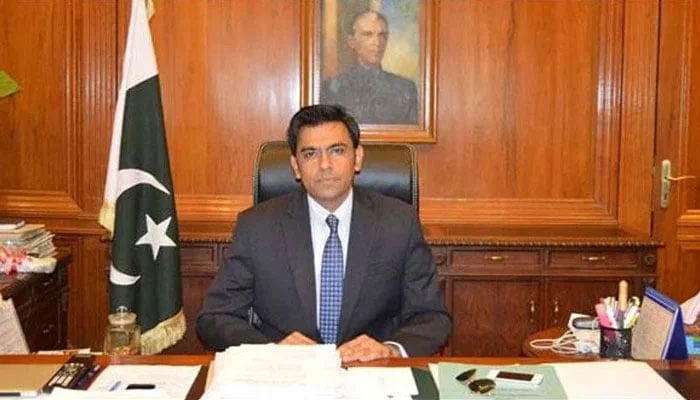Sindh CS tells DCs to prepare flood contingency plans
KARACHI: Sindh Chief Secretary Syed Asif Hyder Shah on Friday held a meeting in Karachi to review preparations for managing the potential devastation which could be caused by heavy rains and flooding anticipated from July to September.
The meeting was attended by Minister for Local Government Saeed Ghani, Minister for Revenue and Rehabilitation Makhdoom Mehboob Zaman, senior members of Board of Revenue Baqaullah Unar, Secretary Local Government Syed Khalid Hyder Shah, Secretary Rehabilitation Waseem Shamshad, DG Rescue 1122 Dr Abid Shaikh and representatives from the Army, police, Hesco and Sepco.
Additionally, all divisional commissioners, deputy commissioners, and assistant commissioners participated via video link.
Minister for Revenue and Rehabilitation Mehboob Zaman briefed the meeting on the preparedness measures, highlighting that above-average rainfall is expected during this period, which, combined with glacial melt, could bring 500,000 to 900,000 cusecs of water into the Indus River.
He noted that in 2022, Padidan experienced 1,026% more rainfall than usual, and Larkana saw 584% above-average rainfall. He also mentioned that Karachi, Jamshoro, and Sukkur warehouses are stocked with 300,000 tarps, 1.9 million mosquito nets, and 572 heavy dewatering pumps.
CS Shah instructed all departments to maintain contact with the Meteorological Department and the PDMA. He directed the deputy commissioners to convene District Disaster Management Authority meetings to prepare medium and high flood contingency plans.
He emphasised ensuring the availability of emergency equipment, machinery, dewatering pumps, and emergency staff. Furthermore, he mandated the creation of an inventory of all resources, including life jackets, boats, and rescue personnel available in each district.
The CS stressed the need for heightened awareness and preparedness due to climate change, which was causing more frequent and severe rain and flood events. He warned of the risk of urban flooding in major cities of Sindh and instructed the Department of Relief to keep all agencies informed about weather conditions and preparedness measures.
He also emphasised informing the residents of the Indus River’s catchment areas about the situation. The Health Department was directed to declare an emergency in hospitals and ensure the availability of medicines, particularly for malaria and waterborne diseases.
Minister Saeed Ghani highlighted the inclusion of local government representatives in rehabilitation efforts. He announced that relief camps would be set up at the union council level in any emergency situation and emphasised the need to store ration, tents, and other essential supplies in district warehouses to prevent logistical issues faced during previous rains. He assured the meeting that funds would soon be provided to WASA in Hyderabad to ensure the cleaning of stormwater drains.
The meeting was informed that riverine floods have been ascertained through Seasonal Hydrological Forecast. There is 95% chance of high flows in Indus River. The high flows at barrages in Indus are considered to be in range between 500,000 and 900,000 cusecs. Moreover, the forecast for above normal rains can produce rain induced floods. June, July, August and September are likely to remain wet months with July and August wettest.
The rains in June and July may be violent accompanied with thunderstorms, heavy showers of short duration. However, spells in August are likely to be calm, connected, consecutive and long duration therefore, more dangerous because natural depressions, drainage system and soil permeability likely to be saturated with earlier spells held during June and July.
-
 Threads Launches Dear Algo AI Feature To Personalise Feeds In Real Time
Threads Launches Dear Algo AI Feature To Personalise Feeds In Real Time -
 Police Take Action Over Andrew's Ties With Jeffrey Epstein While In UK Office
Police Take Action Over Andrew's Ties With Jeffrey Epstein While In UK Office -
 Courtney Love Makes First Appearance Since New Report On Kurt Cobain's Death
Courtney Love Makes First Appearance Since New Report On Kurt Cobain's Death -
 King Charles Anxious As Uncertainty Grows Over Sarah Ferguson’s Next Move
King Charles Anxious As Uncertainty Grows Over Sarah Ferguson’s Next Move -
 Real Reason Kim Kardashian Is Dating Lewis Hamilton
Real Reason Kim Kardashian Is Dating Lewis Hamilton -
 Rihanna Leaves Elderly Woman Star-struck In Viral Grocery Store Video
Rihanna Leaves Elderly Woman Star-struck In Viral Grocery Store Video -
 TikTok US Launches Local Feed Using Precise Location Data
TikTok US Launches Local Feed Using Precise Location Data -
 Jill Biden’s Former Husband Charged With Wife’s Murder
Jill Biden’s Former Husband Charged With Wife’s Murder -
 Zayn Malik Reveals Parenting Decision Gigi Hadid Criticized Him Over
Zayn Malik Reveals Parenting Decision Gigi Hadid Criticized Him Over -
 Palace Releases Prince William's Photos From Final Day Of His Saudi Arabia Visit
Palace Releases Prince William's Photos From Final Day Of His Saudi Arabia Visit -
 Microsoft Warns Of AI Double Agents As Enterprise Adoption Of AI Agents Surges
Microsoft Warns Of AI Double Agents As Enterprise Adoption Of AI Agents Surges -
 Kate Middleton, Prince William Break Silence Over Tragic Shooting In Canada
Kate Middleton, Prince William Break Silence Over Tragic Shooting In Canada -
 'Finding Her Edge' Star Madelyn Keys Explains Adriana's Remarks About Brayden Romance
'Finding Her Edge' Star Madelyn Keys Explains Adriana's Remarks About Brayden Romance -
 Royal Expert Raises Questions Over Sarah Ferguson's 'plotting' Stunning Comeback
Royal Expert Raises Questions Over Sarah Ferguson's 'plotting' Stunning Comeback -
 Instagram Develops AI ‘Create My Likeness’ Tool To Generate Personalised Photos And Videos
Instagram Develops AI ‘Create My Likeness’ Tool To Generate Personalised Photos And Videos -
 Meghan Markle, Prince Harry Friends Suggest Their Marriage 'isn't All It Seems'
Meghan Markle, Prince Harry Friends Suggest Their Marriage 'isn't All It Seems'




